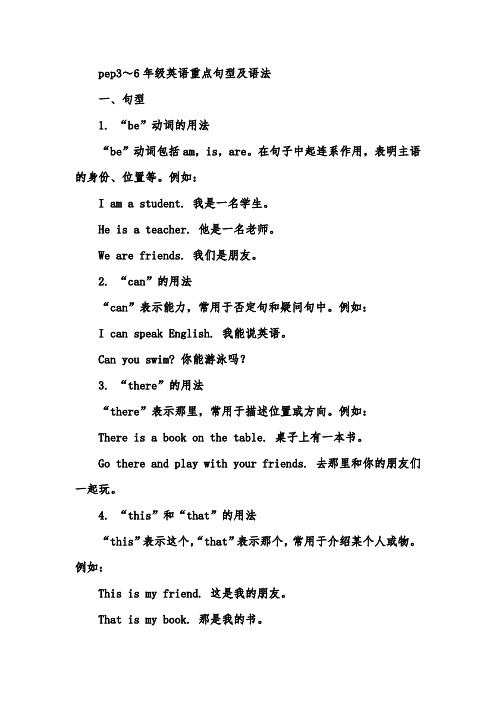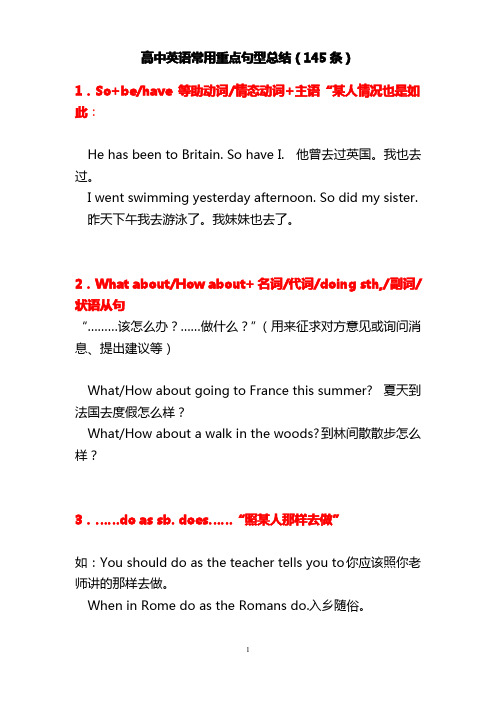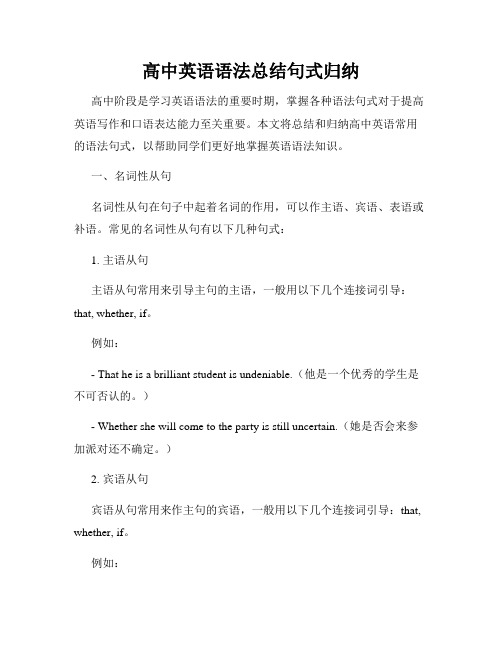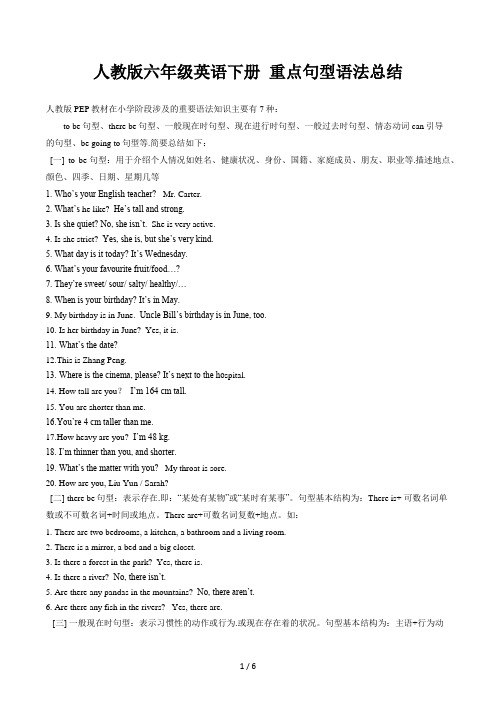英语语法中的重点句型
英语语法知识点总结

课时一教学任务一、重点语法1.动词be(am,is,are)的用法:be动词包括“am”, “is”, “are”三种形式。
①第一人称单数(I)配合am来用。
句型解析析:I am+…②第二人称(You)配合are使用。
句型解析:You are+…③第三人称单数(He or She or It)配合is使用。
句型解析:She(He, It) is +……④人称复数 (we /you/they)配合are使用。
句型解析:We (You, They) are +……例句 We are in Class 5,Grade are my are good students.用法口诀:我(I)用am, 你(you)用are,is跟着他(he),她(she),它(it)。
单数名词用is,复数名词全用are。
变否定,更容易,be后not加上去。
变疑问,往前提,句末问号莫丢弃。
还有一条须注意,句首大写莫忘记。
1.用括号中适当的词填空。
1. I ________(am, are, is) from Australia.2. She _______ (am, are, is) a student.3. Jane and Tom _________(am, is, are) my friends.4. My parents _______ (am, is, are) very busy every day.5. _______ (Are, Is, Do, Does) there a Chinese school in New York6. _______ (Be, Are, Were, Was) they excited when he heard the news7. There _____ (be) some glasses on it.8. If he _____ (be) free tomorrow, he will go with us.2.用be 动词的适当形式填空1. I ______ a boy. ______ you a boy No, I _____ not.2. The girl______ Jack's sister.3. The dog _______ tall and fat.4. The man with big eyes _______ a teacher.5. ______ your brother in the classroom6. Where _____ your mother She ______ at home.7. How _______ your father8. Mike and Liu Tao ______ at school.9. Whose dress ______ this10. Whose socks ______ they11. That ______ my red skirt.12. Who ______ Ijeans ______ on the desk.______ a scarf for you.15. Here ______ some sweaters for you.16. The black gloves ______ for Su Yang.17. This pair of gloves ______ for Yang Ling.18. The two cups of milk _____ for me.19. Some tea ______ in the glass.20. Gao shan's shirt _______ over there.第二课时(1)英语人称代词和物主代词一、人称代词表示“我”、“你”、“他”、“她”、“它”、“我们”、“你们”、“他们”的词,叫做人称代词。
英语重点语法(考试必备)

英语重点语法(考试必备)一、主语是个句子,或者从句在句中充当主语1.当主语是陈述句时,连接词是that 即:that(不省略)+该陈述句Eg. 1.) That we will be late is certain. (We will be late.)Eg. 1.) That we will be late is certain. (主语从句,that不能省略)2.) I hope (that) we will win the game. (宾语从句,that 可以省略)2.当主语是一般疑问句时,连接词是whether(or not)1.) Whether he will go there is not known. (Will he go there?)2.) Whether they can finish the job (or not) is not clear. (Can they finish the job?)3.当主语是特殊疑问句时,连接词是特殊疑问词“8W+H”即:特殊疑问词“8W+H” +该特殊疑问句的陈述语序(注:8W指的是what/where/which/who/whom/why/whose/when, H 指的是how)1)What he did yesterday is not known. (What did he do yesterday?)2)Where he went yesterday is not clear. (Where did he go yesterday?)3)Which team he liked has not been decided. (Which team did he like?)4)Who won the game seems certain. (Who won the game?)5)Whom he met yesterday is not clear. (Whom did he meet yesterday?)6)Why he was late for the meeting is to be found out.(Why was he late for the meeting?)7)Whose book this is is not clear. (Whose book is this?)8)When he will arrive is not known. (When will he arrive?)9)How we will help the lost boy will be discussed at the meeting.(How will we help the lost boy?)二、主语从句后置1.为了避免主语冗长,句子头重脚轻,经常用it作形式主语,主语从句放在后面作真正的主语.1.) That we will be late is certain.-- It’s certain that we will be late.2.) Whether he will go there is not known.-- It is not known whether he will go there.3.) Where he went yesterday is not clear.-- It is not clear where he went yesterday.2.It 作形式主语常用句型:(that 引导的主语从句是真正的主语)It is possible/important/necessary/clear that...1)It’s said/ reported that.. 据说/据报道…2)It’s been announced/declared that... 已经通知/宣布…3)It seems/appears/happens that… 显然、明显、碰巧..4)It’s no wonder that…并不奇怪/无疑…3.主语从句中谓语动词一般用单数,What引导的主语从句,谓语动词根据表语决定What he needs _is_ that book. What he needs _are_ some books.4.What 与that 引导主语从句的区别Eg. (1) What you said yesterday is right. (What did you say yesterday?)(2) That she is still alive is a puzzle. (谜题) (She is still alive.)练习题1.___ he made an important speech at the meeting was true.A. ThatB. WhyC. WhatD. How2. ___we’ll go camping tomorrow depends on the weather.A IfB WhetherC ThatD Where3.___ is known to us all is that America is a developed country.A. WhichB. AsC. WhatD. It4. It’s known to us all ___ a form of energy .A. water isB. that water isC. is waterD. that water to三、宾语从句一、宾语从句: 宾语是个句子,或者说从句在句中充当宾语1.当宾语是陈述句时,连接词是that 即:that(可省略)+该陈述句1.) I hope (that) he will come tomorrow. (He will come tomorrow.)1.) That we will be late is certain. (主语从句,that不能省略)2.) I believe (that) we will win the game. (宾语从句,that 可以省略)2. 当宾语是一般疑问句时,连接词是whether(or not)/if即:whether(or not)/if +该一般疑问句的陈述语序1.) I ask whether/if Tom knows Jack. (Does Tom know Jack?)2.) I don’t know whether/if he came back yesterday. (Did he come back yesterday?)3. 当宾语是特殊疑问句时,连接词是特殊疑问词“8W+H”即:特殊疑问词“8W+H” +该特殊疑问句的陈述语序(注:8W--what/where/which/who/whom/why/whose/when, H--how)1)I don’t know what he did yesterday. (What did he do yesterday?)2)He wants to know where he went yesterday. (Where did he go yesterday?)3)He didn’t tell me which team he liked. (Which team did he like?)4)We want to know who won the game at last. (Who won the game?)5)His mom asked whom he met yesterday. (Whom did he meet yesterday?)6)He didn’t find out why he was late for the meeting.(Why was he late for the meeting?)7)I am not sure whose book this is. (Whose book is this?)8)They ask me when he will arrive. (When will he arrive?)9)We have discussed how we will help the lost boy.(How will we help the lost boy?)1.当主句的谓语动词是command/demand/insist/order/require/suggest等表示要求或建议的动词时,从句谓语动词用(should)+动词原词,should 可以省略eg (1)She required (that) he (should) go back home right now.She required (that) he go back home right now.(2)I suggested (that) he (should) ask his teacher for help.I suggested (that) he ask his teacher for help.2.当主句中believe/expect/suppose/think等作谓语动词时,否定要前移Eg. I don’t think that he will come tomorrow. (He won’t come tomorrow.) He doesn’t believe that it is true. (It is not true.)3.宾语从句从句的语序必须是陈述语序,即连接词+主语+谓语+其他成分eg. I believe that they will come soon. He asked me whether I was a teacher.They wanted to know what they can do for us.4.宾语从句的时态受主句的限制主句是一般现在时态,从句根据实际情况而定主句是一般过去时态,从句用相应的过去的时态如果从句的动作发生在主句之前,则从句要用过去完成时态eg. 1)She says that she is a student.She said that she was a student.2)She says that she will fly to Japan in a week.She said that she would fly to Japan in a week.5.由whether或特殊疑问词8W+H引导的宾语从句如果宾语从句的主语和主句的主语是同一对象,可以用“疑问词+不定式”做宾语的简单句结构I don’t know what I should do next.I don’t know what to do next.He didn’t know where he would live.He didn’t know where to live.He wasn’t clear which way he should go to reach the bank.=He wasn’t clear which way to go to reach the bank.6.含有宾语补足语时,若宾语是个句子,宾语通常用形式宾语it 代替,真正的宾语放在宾语补足语之后Eg. 1) We think it wonderful that we will go on a trip this weekend. (宾语是陈述句)2) I think it uncertain whether we will win the game. (宾语是一般疑问句)3) We hope it discussed how we will solve the problem. (宾语是特殊疑问句)练习题1. —Do you know ______ the Capital Museum(首都机场)?—Next Friday.A. when will they visitB. when they will visitC. when did they visitD. when they visited2. –Can you tell me ______?–She is in the computer lab(计算机实验室).A. where Linda wasB. where is LindaC. where was LindaD. where Linda is 3。
英语语法解析重点掌握句型与语法规则

英语语法解析重点掌握句型与语法规则英语语法解析:重点掌握句型与语法规则在学习英语的过程中,掌握句型和语法规则是非常重要的。
正确使用句型和语法规则可以使我们的英语表达更加准确、流畅,同时也能够避免一些常见的语法错误。
本文将介绍一些常用的句型和语法规则,并提供一些例句以供参考。
一、主谓一致主谓一致是指主语与谓语在人称和数上要保持一致。
如果主语是第三人称单数,则谓语动词要加上“-s”或“-es”。
例句:1. She likes to read books.(她喜欢读书。
)2. The cats play with each other.(这些猫互相玩耍。
)二、宾语宾语是动词的补充成分,可分为直接宾语和间接宾语。
1. 直接宾语是动作的承受者或所影响的对象。
2. 间接宾语是直接宾语的间接所在之处或所给予之者。
例句:1. He gave me a present.(他给了我一个礼物。
)2. They showed us their photos.(他们给我们看了他们的照片。
)三、条件句条件句用于表达某个条件下可能发生的结果,可以分为三种类型:零条件句、一般条件句和虚拟条件句。
1. 零条件句用于表示客观真理或普遍性的条件。
例句:Water boils at 100 degrees Celsius.(水会在100摄氏度沸腾。
)2. 一般条件句用于表示可能发生的条件和结果。
例句:If it rains, we will stay at home.(如果下雨,我们就会待在家里。
)3. 虚拟条件句用于表示不太可能实现的条件和结果。
例句:If I were you, I would study harder.(如果我是你,我会更加努力学习。
)四、被动语态被动语态用于表示主语是动作的承受者而不是执行者。
被动语态的构成:be动词(根据时态变化)+ 过去分词例句:1. The book was written by Mark Twain.(这本书是马克·吐温写的。
pep3~6年级英语重点句型及语法

pep3~6年级英语重点句型及语法一、句型1. “be”动词的用法“be”动词包括am,is,are。
在句子中起连系作用,表明主语的身份、位置等。
例如:I am a student. 我是一名学生。
He is a teacher. 他是一名老师。
We are friends. 我们是朋友。
2. “can”的用法“can”表示能力,常用于否定句和疑问句中。
例如:I can speak English. 我能说英语。
Can you swim? 你能游泳吗?3. “there”的用法“there”表示那里,常用于描述位置或方向。
例如:There is a book on the table. 桌子上有一本书。
Go there and play with your friends. 去那里和你的朋友们一起玩。
4. “this”和“that”的用法“this”表示这个,“that”表示那个,常用于介绍某个人或物。
例如:This is my friend. 这是我的朋友。
That is my book. 那是我的书。
5. “what”和“where”的用法“what”常用于询问事物或人的身份,“where”常用于询问位置或方向。
例如:What is your name? 你叫什么名字?Where is the post office? 邮局在哪里?二、语法1. 现在进行时现在进行时表示正在进行的动作或存在的状态,常与now,look 等词连用。
例如:We are studying now. 我们正在学习。
Look! The bird is singing. 看!那只鸟正在唱歌。
2. 现在完成时现在完成时表示已经完成的动作或过去发生的动作对现在造成的影响或结果。
常与already,just等词连用。
例如:I have already finished my homework. 我已经完成了我的作业。
He has just come back from work. 他刚刚从工作回来。
高中英语常用重点句型总结(145条)

高中英语常用重点句型总结(145条)1.So+be/have等助动词/情态动词+主语“某人情况也是如此:He has been to Britain. So have I.他曾去过英国。
我也去过。
I went swimming yesterday afternoon. So did my sister.昨天下午我去游泳了。
我妹妹也去了。
2.What about/How about+名词/代词/doing sth,/副词/状语从句“………该怎么办?……做什么?”(用来征求对方意见或询问消息、提出建议等)What/How about going to France this summer?夏天到法国去度假怎么样?What/How about a walk in the woods?到林间散散步怎么样?3.……do as sb. does……“照某人那样去做”如:You should do as the teacher tells you to .你应该照你老师讲的那样去做。
When in Rome do as the Romans do.入乡随俗。
4.None of+名词/代词+do/does……“在……中没有任何一个做……”如:None of the telephones can work。
所有的电话都不能工作了。
None of them are/is interested in physics.他们中没有一个人对物理感兴趣。
5.Not+all+复数名词/不可数名词+are/is……“并非全部……”;“并不是所有的……”如:Not all the parts of the car will be made in the factory.并不是所有的汽车部件都在这家工厂制造。
Not all the students can pass the exam.并非所有的同学都能通过考试。
Not all factories here produce shirts.这儿的工厂不都生产衬衣。
大学英语语法重点

二、may can might could 的异同
1. May / might 事实上的可能 2. Can / could 理论上的可能
The road may be blocked. The road can be blocked. Can he tell a lie? Yes, he may. 3. Not 否定 may /might, 否定的是句子中的主动词。 They may / might not get there on time tomorrow. They can / could not get there on time tomorrow.
三、做状语 –ing/ to
1. In order to, so as to, only to, too…to.., so … as to… 2. 悬垂
Going home, mother cooked a good meal. 3. 独立主格
Weather permitting, we will go for a picnic tomorrow. 4. -ing/-ed 主动 被动
Ought to 与should 基本类似,但强调责任、义务、应该做, 或者逻辑上的必然性时用ought to
As a student you ought to study hard. I think I should try to lose some weight. It is starry tonight; it ought to be a fine day tomorrow.
3. needn’t have done Since the meeting has been canceled, they needn’t
高中英语语法总结句式归纳

高中英语语法总结句式归纳高中阶段是学习英语语法的重要时期,掌握各种语法句式对于提高英语写作和口语表达能力至关重要。
本文将总结和归纳高中英语常用的语法句式,以帮助同学们更好地掌握英语语法知识。
一、名词性从句名词性从句在句子中起着名词的作用,可以作主语、宾语、表语或补语。
常见的名词性从句有以下几种句式:1. 主语从句主语从句常用来引导主句的主语,一般用以下几个连接词引导:that, whether, if。
例如:- That he is a brilliant student is undeniable.(他是一个优秀的学生是不可否认的。
)- Whether she will come to the party is still uncertain.(她是否会来参加派对还不确定。
)2. 宾语从句宾语从句常用来作主句的宾语,一般用以下几个连接词引导:that, whether, if。
例如:- I don't know if she can finish the task in time.(我不知道她是否能按时完成任务。
)- He asked me whether I had seen the movie.(他问我是否看过那部电影。
)3. 表语从句表语从句常用来作主句的表语,一般用以下几个连接词引导:that, whether。
例如:- My biggest concern is that we won't have enough time.(我最担心的是我们没有足够的时间。
)- The question is whether they will come to the meeting.(问题是他们是否会来开会。
)4. 同位语从句同位语从句用来解释或说明名词的内容,常用连接词that。
例如:- The fact that he won the competition surprised everyone.(他赢得比赛的事实让大家都感到惊讶。
人教版六年级英语下册 重点句型语法总结

人教版六年级英语下册重点句型语法总结人教版PEP教材在小学阶段涉及的重要语法知识主要有7种:to be句型、there be句型、一般现在时句型、现在进行时句型、一般过去时句型、情态动词can引导的句型、be going to句型等.简要总结如下:[一] to be句型:用于介绍个人情况如姓名、健康状况、身份、国籍、家庭成员、朋友、职业等.描述地点、颜色、四季、日期、星期几等1. Who’s your English teacher? Mr. Carter.2. What’s he like? He’s tall and strong.3. Is she quiet? No, she isn’t. She is very active.4. Is she strict? Yes, she is, but she’s very kind.5. What day is it today? It’s Wednesday.6. What’s your favourite fruit/food…?7. They’re sweet/ sour/ salty/ healthy/…8. When is your birthday? It’s in May.9. My birthday is in June. Uncle Bill’s birthday is in June, too.10. Is her birthday in June? Yes, it is.11. What’s the date?12.This is Zhang Peng.13. Where is the cinema, please? It’s next to the ho spital.14. How tall are you?I’m 164 cm tall.15. You are shorter than me.16.You’re 4 cm taller than me.17.How heavy are you? I’m 48 kg.18. I’m thinner than you, and shorter.19. What’s the matter with you? My throat is sore.20. How are you, Liu Yun / Sarah?[二] there be句型:表示存在.即:“某处有某物”或“某时有某事”。
